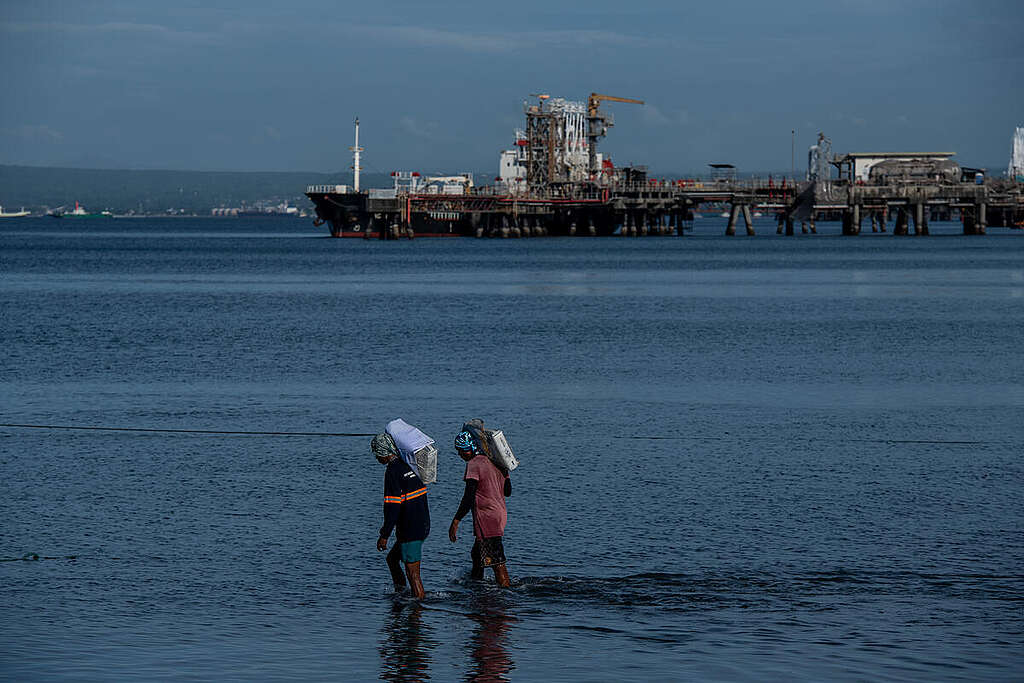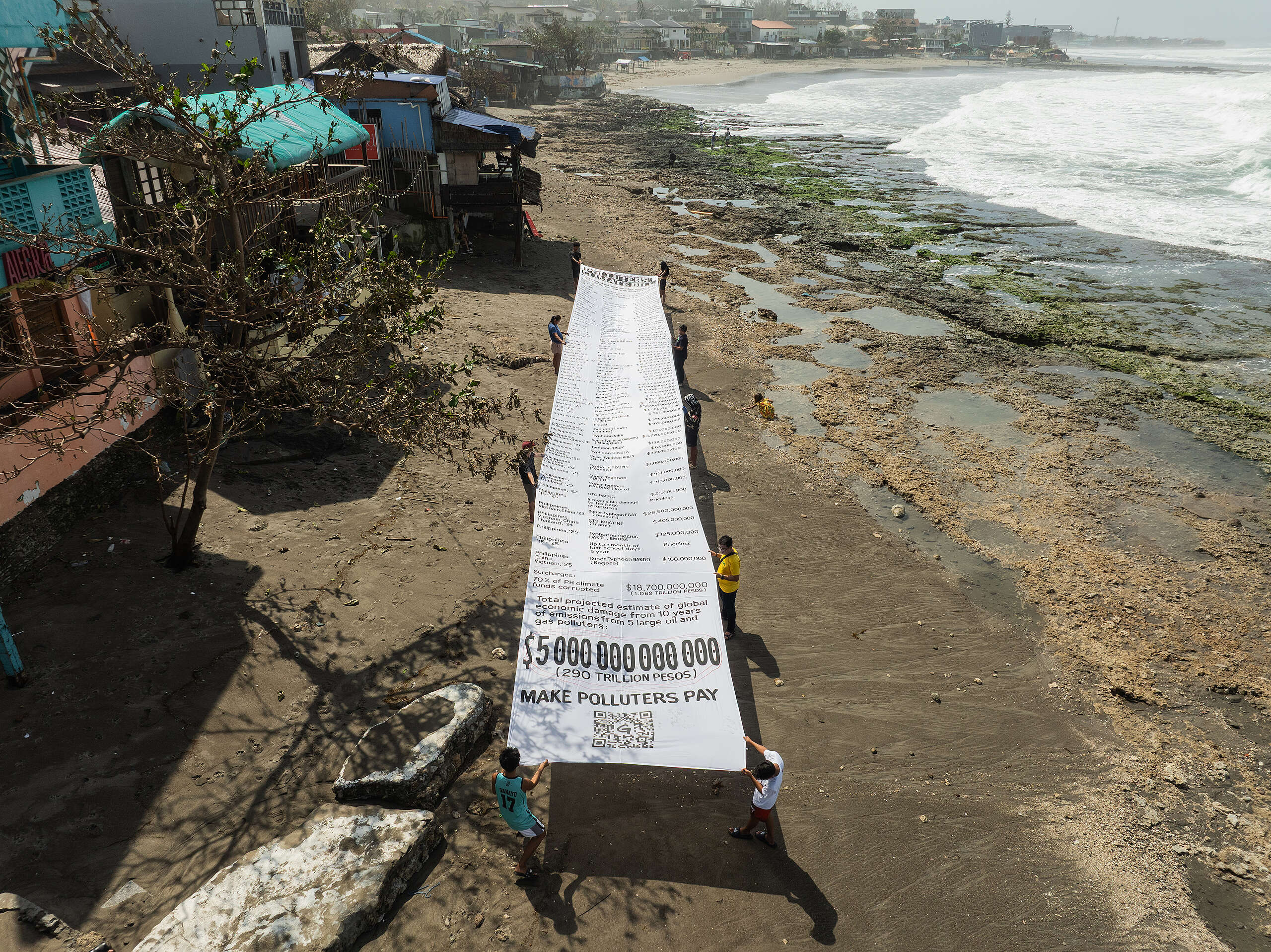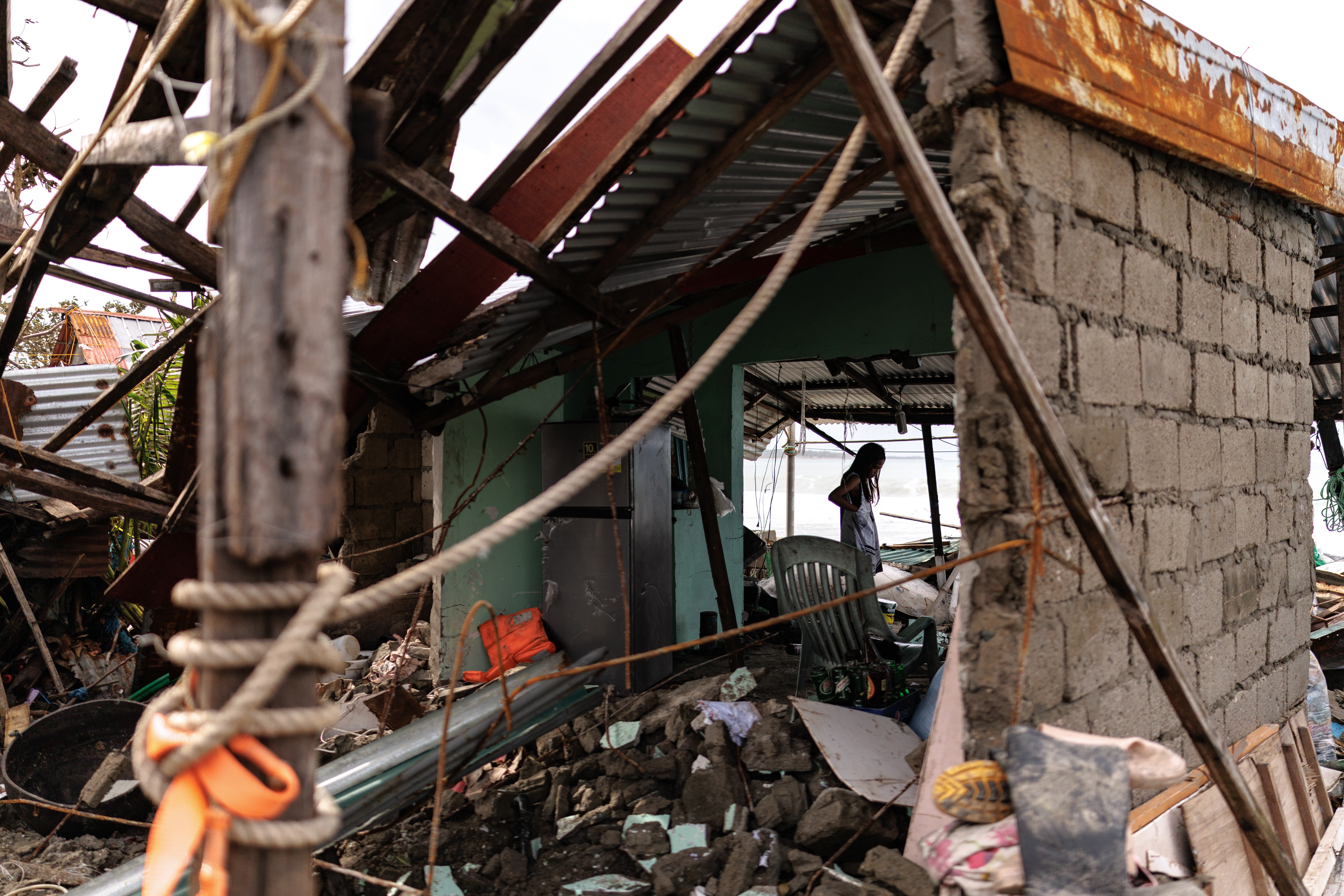Global heating from carbon emissions of nine companies could kill 360,000

QUEZON CITY, Philippines (05 December 2023)—An estimated 360,000 people could die prematurely before the end of the century because of global heating caused by the 2022 greenhouse gas emissions of nine major European oil and gas companies alone, according to a Greenpeace Netherlands study.
Released today at COP28, the study analyzes the self-reported 2022 greenhouse gas emissions of nine major European oil and gas companies: Shell, TotalEnergies, BP, Equinor, Eni, Repsol, OMV, Orlen, and Wintershall Dea. Using the Mortality Cost of Carbon method developed by US researcher R. Daniel Bressler, it estimates that these companies could collectively cause an estimated 360,000 temperature-related premature deaths before the end of the century with their emissions of 2.7 billion metric tons of CO2 from 2022 alone.[1]
Greenpeace Philippines senior campaigner Virginia Benosa-Llorin said: “This only confirms what we have known for decades: the dirty business of fossil fuels is actively harming communities who have the least contribution to the climate crisis, and thus must be stopped from continuing to profit from climate destruction. With developments in the loss and damage discourse being tackled at COP28, our government must not waste this opportunity—they must stand with communities and ensure that oil and gas companies most responsible for worsening climate change pay reparations for climate loss and damage.
“Moreover, the government must throw all its support in expediting the passage of the Climate Accountability (CLIMA) Bill in Congress, and pursue any and all means necessary in pursuing climate justice for Filipinos struggling with this crisis.”
According to the report, the estimates are likely extremely conservative for five reasons: they only consider excess deaths caused directly by extreme temperatures and don’t assess other climate impacts like more frequent and more extreme flooding, drought, wildfires or storms or infectious disease; they don’t take into account deaths caused by air pollution resulting from burning fossil fuels, or other hazards that result from the production and use of fossil fuels; the companies’ self-reported carbon emissions could be lower than estimates applying other carbon accounting approaches; the study uses a conservative future greenhouse gas emissions scenario; and this estimate only looks at the year 2022, meaning these excess deaths will multiply year by year if fossil fuel emissions are not drastically cut. For these reasons, the true number of premature deaths attributable to the greenhouse gas emissions of the nine oil and gas companies could be larger.
Greenpeace Philippines believes the impact would be much greater in vulnerable countries such as the Philippines, which has once again topped the World Risk Index for the 13th straight year. The index measures exposure to natural disasters and countries’ societal capacity to respond.[2]
Bohol 1st District Rep. Edgar Chatto, principal author of the CLIMA Bill, said: “The way to address adverse effects of climate change is not the responsibility of the state or government alone. All stakeholders who call Earth their home are responsible for this and the generations to come. The issue of climate change should, at the very least, call us to look into our processes to ensure that we are not doing harm. Private corporations may do well in leading green and sustainable practices towards the shared goal of ensuring that the environment is given the care it deserves for the continued existence of humanity. In the interim, companies whose practices do not comply with global standards in terms of carbon emissions must be held accountable and face the full extent of the law.”
Leyte 3rd District Rep. Anna Veloso-Tuazon, co-author of the CLIMA Bill, said: “Attribution science confirms that fossil fuel dependence increases the risk of slow-onset events associated with the adverse impacts of climate change, so we need to treat conduct contributing to climate change as a harm in and of itself. Changes on a global scale begin with local buy-in, and we—states, institutions, entities, corporations, and individuals—all have to help move the needle by shifting consumer behavior and disincentivizing business-as-usual conduct that detracts from our climate ambition to limit global warming and make the Paris Agreement work for our people and our planet.”
Greenpeace Philippines is calling on the Philippine government to make fossil fuel companies pay for losses and damages experienced by impacted communities. The group demands that climate-destroying businesses must 1) acknowledge their disproportionate role in historical carbon emissions and commit to a just transition away from fossil fuels; 2) stop all fossil fuel expansion; and 3) pay up for the economic and non-economic loss and damages caused by climate impacts. To this end, the Greenpeace flagship Rainbow Warrior and activists on kayaks recently blockaded a Shell import terminal in Batangas City, calling on the Marcos administration to “make climate polluters pay” for their outsized role in the climate crisis.
###
Notes to editors:
[1] About the Mortality Cost of Carbon method: The Mortality Cost of Carbon was developed by US researcher R. Daniel Bressler to estimate the number of expected temperature-related excess deaths which will take place globally until the year 2100, caused by present day carbon emissions.
| Self-reported CO2e emissions for the year 2022 and projected consequent mortality estimates derived using the Mortality Cost of Carbon metric for a selection of European oil and gas companies | ||
| Company | 2022 Emissions (Mt CO2e) | Cumulative temperature-related excess deaths until 2100 (MCC) projected from such emissions |
| Shell | 968.0 | 130,000 |
| TotalEnergies | 437.0 | 57,000 |
| BP | 342.2* | 45,000* |
| Equinor | 256.9 | 34,000 |
| Eni | 204.2 | 27,000 |
| Repsol | 198.1 | 26,000 |
| OMV | 112.0 | 15,000 |
| Orlen | 110.4 | 15,000 |
| Wintershall Dea | 77.9 | 10,000 |
| Combined total | 2706.7 | 360,000** |
*Instead of reporting scope 3 category 11 emissions, BP introduces the category “emissions from carbon of own upstream production” in their reports which only covers part of the emissions that the other eight companies report under scope 3 category 11.
**This is the sum of cumulative temperature-related excess deaths by 2100 projected using emissions equivalent to those from each company, rounded to 2 significant figures.



